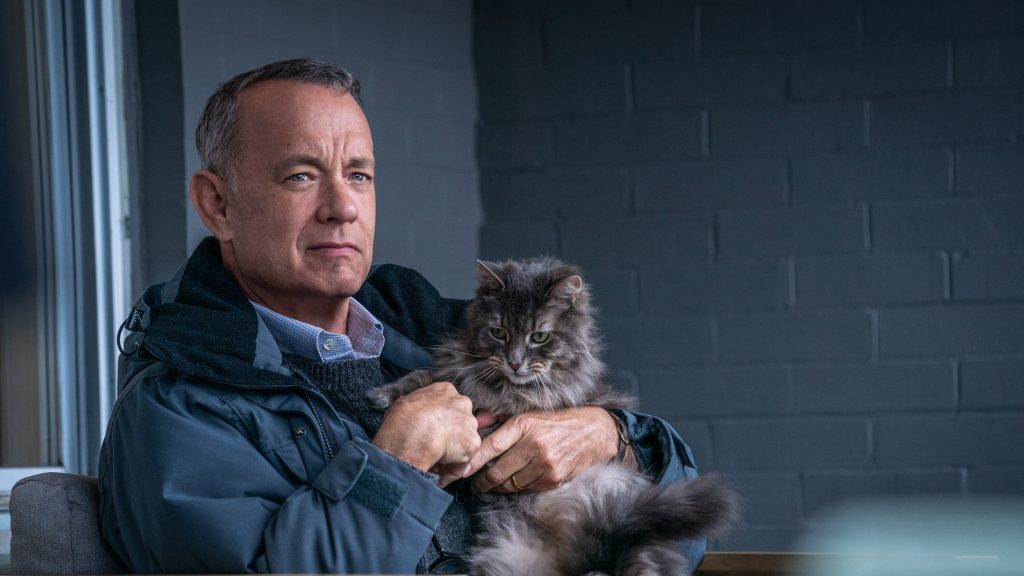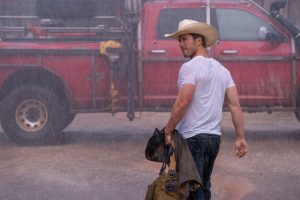Reviews include Deadpool & Wolverine, Doubles, and Mountain Queen: The Summits of Lhakpa Sherpa.
TFCA Friday: Week of Jan. 6
January 6, 2023

Welcome to TFCA Friday, a weekly round-up of film reviews and articles by TFCA members.
ICYMI: We are now accepting applications for the TFCA Emerging Critic Award. Apply today!
The 26th annual TFCA Awards will be announced on Sunday, January 8th beginning at 11:30am. Follow along on Twitter as we name the winners and the nominees for the Rogers Best Canadian Film Award, which carries a cash prize of $100,000 – the largest purse in Canadian film!
In Release this Week
Corsage (dir. Marie Kreutzer)
“The film is strikingly beautiful to watch with attention to detail in every visual element from wardrobe to furnishings, art, table settings, music, nature, and hair – which becomes a plot point, in effect, a deep bath in voluptuous waters,” writes Anne Brodie at What She Said. “The story is not the whole truth but makes for a heck of an ending. Krieps’ incredible gift for expression – again- comes in transferring her soul and emotion through those eyes and near-perfect face.”
“Krieps is wonderful in Corsage, as she is in everything I have viewed with her in it,” notes Marc Glassman at Classical FM. “I love the integrity of her performances and the way she has of thinking through her characters to arrive at the core of their entities. Film posters for Corsage show the attractive but withdrawn Elisabeth/ Kriepsflipping her finger at the audience. The overriding emotions in the film are anger and ennui. Empress Elisabeth wants adulation but is profoundly dissatisfied with her life. She’s caught in a trap but can’t get out. She has lots of privileges but can’t move away from her life and role in it.”
Far Beyond the Pasturelands
(dir. Maude Plante-Husaruk, Maxime Lacoste-Lebuis 🇨🇦)
“Far Beyond the Pasturelands finds in this small story captured high in the mountaintops a tale of globalization and inequality,” writes Pat Mullen at POV Magazine. “It’s a human story, simply and modestly told, which is appropriate. Plante-Husaruk and Lacoste-Lebuis manage the production with a skeleton crew, as the former handles (striking) cinematography and the latter the sound. In post, the editing is by Plante-Husaruk and the music, a highlight of the film, by Lacoste-Lebuis. The filmmakers afford Lalita’s story a measure of intimacy and let the pace of the film unfold to the beat of the harvest. Fans of slow cinema should be taken by the measured pace of the harvest and the sacrifices it entails. Like Lalita’s own situation, it invites much contemplation.”
Hold Me Tight (dir. Mathieu Amalric)
“The Luxembourg-born [Krieps], who first came to prominence as the destructive muse to Daniel Day-Lewis’ dress designer in Phantom Thread, keeps finding ways to reveal how complex and dualistic a character can be. Last year, she starred in Mia Hansen-Løve’s Bergman Island. And this year, she gave a brilliant performance in Austria’s Oscar [submission], Marie Kreutzer’s Corsage, an anachronistic biopic about the Hapsburg Empress Elisabeth of Austria whose pedestal becomes a prison,” writes Liam Lacey at Original Cin. “In Hold Me Tight, Krieps gives us a character who seems to be living in two dimensions, simultaneously in the present physical moment and mentally in the past, future and imaginary. She’s a ghost, haunting the dream of her own life.”
If These Walls Could Sing (dir. Mary McCartney)
“For her first full length documentary McCartney looks at the history of the studio through a range of the music recorded there,” writes Karen Gordon at Original Cin. “Although she uses her personal connection to the studio as the premise, If These Walls Could Sing ends up being a worthy history of a building that, for more than 90 years, has seen and withstood changes in music and technology, and still retains the magic that came from what the Beatles accomplished there.”
Love, Charlie: The Rise and Fall of Chef Charlie Trotter
(dir. Rebecca Halpern)
“Director Halpern has described her film as a cautionary tale about the pursuit of excellence. And if Love, Charlie isn’t really that, it’s still a lively character study,” notes Liam Lacey at Original Cin. “What’s most interesting here is the glimpses of insight into Trotter’s unusual mind. Through interviews with his first wife, we hear of Trotter as a socially awkward student she first met in 1981.”
“[T]he study in workaholism lets Love, Charlie: The Rise and Fall of Chef Charlie Trotter rise above the wave of celebrity chef documentaries that popped up as quickly as high-end eateries piggybacked on Trotter’s trailblazing cuisine,” writes Pat Mullen at POV Magazine. “One sees the physical change in Trotter’s persona and comportment. The innocent sparkle one observes in the first act extinguishes in favour of a hardened, laser-focused precision. There’s a point at which Trotter’s perfectionism confuses art with science.”
A Man Called Otto (dir. Marc Forster)
“Not exactly heartwarming, it has a bitter edge, forgoes easy sentiment, and lifts us,” observes Anne Brodie at What She Said. “Otto is a widower in a community housing enclave in Toledo, Ohio; he does his rounds every day, inspecting the hood for negligence which he’s quick to point out. Trash out at the wrong time, unsorted recycling, newspapers thrown incorrectly, noise and snow unshovelled. Particularly driving the wrong way. Even so, he is tolerated and grudgingly liked as a vital part of the longstanding community.”
“It is as if every time Forster is presented with an opportunity to do something mildly unconventional – or even, gasp, European in sensibility – he defaults to the easy and cheap Hollywood option,” notes Barry Hertz at The Globe and Mail. “Even the central idea of Holm’s and Backman’s material – the darkly comic notion of how one guy just can’t seem to kill himself despite his best efforts – is either mistranslated or more likely ignored wholly by Forster, supplanted with the laziest kind of sentimentality.”
“If I were casting about for an Otto I’d have chosen George Clooney, who’s roughly the same age and has more proven codger chops in such films as Ticket to Paradise and The Midnight Sky,” says Chris Knight at the National Post. “But you know what? Hanks is a good enough actor to make us believe that he’s a man who (A) doesn’t suffer fools gladly and (B) thinks everyone is a fool. We’re barely three minutes into the movie before Otto, trying to buy five feet of rope from a hardware store and being charged for six, demands to speak to the manager. When she has the audacity to be young, he rolls his eyes: ‘Shouldn’t you be in gym class?’”
M3GAN (dir. Gerard Johnstone)
“I was fully prepared to hate this movie, based on its cornball trailer and deadly release date. I was already calling it ‘Muh-Three-Gun,’ singing its name to the tune of the SNL parody MacGruber. It was going to suck,” admits Chris Knight at the National Post. “And then it didn’t. Now, it’s not the second coming of motion pictures, to be sure. But look at the scrawled remarks in my notebook. ‘After Yang not Child’s Play.’ ‘Spielberg’s A.I. but in reverse.’ ‘Cheesy Ex Machina.’ ‘Blonde HAL.’ ‘Tiny Terminator.’ ‘Saved by buffering?’”
The Pale Blue Eye (dir. Scott Cooper)
At the Toronto Star, Marriska Fernandes speaks with Oscar winner Christian Bale and the team of The Pale Blue Eye and learns about how they created the story of Edgar Allan Poe, played in the film by Harry Melling. “He was so good. He was tapping into something that was hypnotizing. He just became Poe to me,” Bale said of Melling. “So he needed nothing from me at all. I would occasionally just sing silly songs and probably throw him off his game more than help him with his game. I think I was more of a nuisance.”
” Notwithstanding the meaningless addition of Poe, Melling is great in the role,” writes Rachel Ho at Exclaim! .”Not only does he bear a strong physical resemblance to the poet, Melling’s off-kilter performance is perfectly in keeping with what is known of Poe. While in a supporting role, Melling quickly takes over the film due in part to Bale, ever the experienced actor, subtly stepping aside to give the floor to Melling.”
“The sombre mood and atmosphere are as much characters as the humans, highlighting the isolation and difficulty of living in a remote, dangerous place near a rushing river, cliffs, deep forests, and emotional young men,” remarks Anne Brodie at What She Said. “Everyone is a suspect. The attention to period detail is intoxicating, and very much part of the experience. The story and its canny twists, is riveting to the final frame.”
“Clocking in at more than two hours, The Pale Blue Eye (the title is from a line in one of Poe’s works) lumbers when it should lunge,” admits Chris Knight at the National Post. “At one point, Spall’s character and Captain Hitchcock (Simon McBurney) berate our man for not making quicker headway on the investigation, and I found myself nodding in agreement. Things are also slowed down by the addition of a barely-there love interest played by Charlotte Gainsbourg.”
“Melling — who got his start playing Dudley Dursley in the Harry Potter movies — plays Poe with a mix of the Southern gentleman and an oddness that sometimes goes over the top,” says Karen Gordon at Original Cin. “But he creates a young man with a piercing intellect, whose interest in the occult doesn’t diminish his ability to see the logical line through a somewhat murky case. He more than holds his own in a cast of heavy hitters.”
File Under Miscellaneous
At The Globe and Mail, Barry Hertz looks at the breakthrough of Canadian International Pictures (CIP), which is distributing Blu-ray restorations of Canadian classics including Nobody Waves Good-bye, Forbidden Love, and Kanehsatake: 270 Years of Resistance. “There is definitely already a Canadian audience that loves these Canadian cult films, but there is also an American audience who are totally open about their lack of knowledge about Canadian cinema and want to learn more,” Jonathan Doyle of CIP tells Hertz. “There is something appealing about this idea of a parallel cinema that is both different and not from American film.”
Also at The Globe and Mail, Barry Hertz lists 23 titles to watch for in ’23, including The Zone of Interest, a new Jonathan Glazer film that’s sure to creep under the skin: “Adapting a Martin Amis novel is no easy thing. Just ask the directors of The Rachel Papers, Out of the Blue or London Fields, if you can find them, writes Hertz. “But Jonathan Glazer is a master – and he’s had time to contemplate his next feature since 2013′s Under the Skin. Set inside Auschwitz, Amis’s novel focuses on a Nazi officer who begins an affair with the wife of the concentration camp’s commander.”
Stream On!
At The Globe and Mail, Johanna Schneller talks with Workin’ Moms’ Catherine Reitman and members of the cast about their character arcs and the price women pay while navigating social systems that still favour men. “That price depended on the belief system in the writers’ room,” writes Schneller. “Did they believe someone should be punished for having an abortion? Absolutely not. Did the sexual harasser face consequences? Initially, no. ‘At first we treated it like just another thing a woman has to deal with, on par with your car battery dying,’ Reitman says. ‘Later we reshot a better ending where he was brought to justice.’ The most fruitful stories boiled down to a single question: What does a working mother who’s doing the best she can look like?”
At Yahoo Canada, Marriska Fernandes breaks down the highlights coming to streamers this month. Among them is a reboot of That ‘70s Show, That ’90s Show, which might have the generation of viewers who grew up with the original series feeling nostalgic and very old at the same time. “Set in 1995, the series follows Leia Forman, daughter of Eric and Donna, who is visiting her grandparents for the summer in Wisconsin. Once there, she bonds with a new generation of Point Place kids under the watchful eye of Kitty and the stern glare of Red,” writes Fernandes.
At What She Said, Anne Brodie checks out The Rig, which is the new series starring Schitt’s Creek alum Emily Hampshire. “She’s Rose and she is comfortably in charge of the male-dominated unit on board the Kinloch Bravo, some of whom resent her power as a woman,” writes Brodie. “An exciting series, well acted and really intense.” Brodie also investigates The Case Against Cosby about alleged sex offender and disgraced comedian Bill Cosby. “Stunning courtroom dramas including [Andrea] Constand’s successful case, and many that followed without convictions, his release, and infamy, complete this sad, sad tale of the monster with political power and a friendly judge in his corner,” notes Brodie. For crime fans, there’s also the British series Death and Nightengales starring Ann Skelly and Matthew Rhys. “The series’ eerie vibe is intriguing and frightening leading up to a fraught final episode,” notes Brodie.
At Original Cin, Kim Huges looks at The Case Against Cosby and the in the story: “That many of Cosby’s victims can’t even recall their assaults because they were drugged somehow makes the whole tawdry fiasco even grimmer. If they had a visual of their rapes, at least they could compartmentalize them. Not knowing precisely what happened ensures imaginations conjure the worst possible scenarios,” writes Hughes. “What emerges most forcefully from Wookey’s film is Constand’s (and Pinkerton’s and Lublin’s and Speir’s and Hill’s) fortitude and grace as well as that of Constand’s family, who speak with admirable candor about what was taken from their vibrant, dignified daughter and sister without her consent by an evil man powerful enough to evade the law. Almost.”



